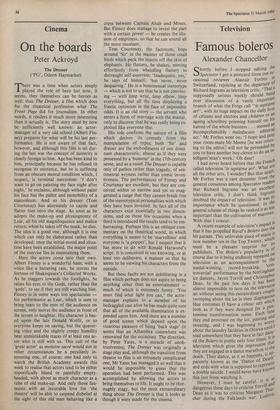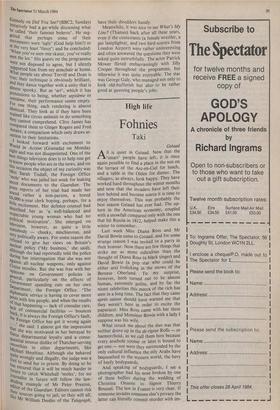Television
Famous boleros
Alexander Chancellor
Shortly before I stopped editing the Spectator 1 got a postcard from our oc- casional reviewer Alastair Forbes irl Switzerland, rejoicing at the departure of Richard Ingrams as television critic. 'That a supposedly serious weekly should hand over discussion of a vastly important branch of what the Frogs call "le septienie art", with its huge impact on the daily lives of citizens and electors and children to an ageing schoolboy preening himself on his hatred of the whole business. . . seemed an incomprehensibly maleducato editorial act.' Mr Forbes went on: 'I hope and praY your room-mate Mr Moore [he was referr- ing to the editor] will not be persuaded bY you to have another boy-clown to do an in- telligent'man's work.' Oh dear! I had never heard before that the French called television 'le septieme art'. What are all the other arts, I wonder? But that apart, Mr Forbes was a rare dissenter from the general consensus among Spectator readers that Richard Ingrams was an excellent television critic. I don't think Ingrains doubted the impact of television. It was its importance which he questioned. In the general scheme of things he ranked it as less important than the cultivation of marrows. With that I concur. A recent example of television's impact is that it has propelled Ravel's Bolero into the hit parade. This unlovable piece of music is now number ten in the Top Twenty, which must be a pleasant surprise for its, publishers. The Bolero's popularity is course due to it being endlessly repeated television as an accompaniment to the medal-winning, record-breaking, troversial' performance by the Nottinghanl ice dancers, Jayne Torvill and Christopher Dean. In the past few days it has been almost impossible to turn on the television set without seeing this extraordinary couPle swooping about the ice in their diaphanott,s blue costumes (1 have a colour set) which look as if they were designed for a Part- tomime transformation scene. Each tit1t! they end prostrate on the ice, panting and sweating, and I was beginningto w o rirYI about the laundry facilities in Ottawa tufo read somewhere that they have in fact darter_ ed the Bolero in public only four times. It Is, television which gives the impression that they are engaged in a dance marathon to death. Their dance, as it so happens, is parently known as the 'Dance of peat and ends with what is supposed to represent a double suicide. I would never have krIctws
this just from watching it. • as However, I must be careful. It is , dangerous these days to criticise Torvill and
Dean as it was to criticise Margaret That- cher during the Falklands war. Ludovt Kennedy on Did You See? (BBC2, Sunday) tentatively had a go while discussing what he called 'their famous boleros'. He sug- gested that perhaps some of their movements were 'ugly' (God help him!) or at the very least 'fussy': and he concluded: When you've seen one skater, you've really seen the lot.' His guests on the programme were not disposed to agree, but I silently ,,,suPPorted him from my armchair at home. 'hat people say about Torvill and Dean is true; their technique is obviously brilliant, and they dance together with a unity that is almost spooky. But as 'art', which it has Pretensions to being, whether septieme or cenrieme, their performance seems empty. .For one thing, each rendering is almost Identical. They look as if they have been trained like circus animals to do something they cannot comprehend. Clive James has compared them to Ginger Rogers and Fred Astaire, a comparison which only draws at- -ention to their limitations. I looked forward with excitement to World in Action (Granada) on Monday night and was not disappointed. One of the best things television does is to help one get to know people who are in the news, and on this occasion the object of my curiosity was !vitss Sarah Tisdall, the Foreign Office trIc'le' who was jailed last week for leaking Secret documents to the Guardian. The Press reports of her trial had made her r6und rather a non-person, a bored little excitement clerk hoping, perhaps, for a "tile excitement. Her defence counsel had described her as 'a well-balanced and respectable young woman who had no n°11tical motivation'. She emerged on television, however, as quite a little somebody — cheeky, mischievous, and very politically aware. For some reason she refused to give her views on Britain's nuclear policy (`My business,' she said), although she had reportedly told the police during her interrogation that she was not ggainst all nuclear weapons, only against c ,ru. Ise missiles. But she was free with her 'Pinions on Government policies in general, particularly on the effects of Government spending cuts on her own diplomatic the Foreign Office. 'The service is having to cover more 13 StS with less people, and when the results _° that happening — lack of consular care, ek of commercial facilities — bounces back it is always the Foreign Office's fault, the Foreign Office has got it wrong again that she she said. I almost got the impression tnat e was motivated in her betrayal by fierce departmental loyalty and a conse- ',.nerttial intense dislike of Thatcher-serving 'Nlii?oothies in other departments, like
Heseltine. Although she behaved
cutte wrongly and illegally, the judge was a f!°131 to send her to prison. By doing so he has ensured that it will be much harder in !Inure to catch Whitehall 'moles', for no lan,Urnalist in future will follow the law- ding ;dn. nr ample of Mr Peter Preston, of the Guardian. Editors cannot risk I-Lelr sources going to jail, so they will all, I"e Mr William Deedes of the Telegraph,
have their shredders handy.
Meanwhile, it was nice to see What's My Line? (Thames) back after all these years, even if the contestants (a female wrestler, a gas lamplighter, and two bird-scarers from London Airport) were rather uninteresting and often answered the questions they were asked quite untruthfully. The actor Patrick Mower flirted embarrassingly with Idly Cooper throughout the programme, but otherwise it was quite enjoyable. The star was George Gale, who managed not only to look old-bufferish but also to be rather good at guessing people's jobs.















































 Previous page
Previous page